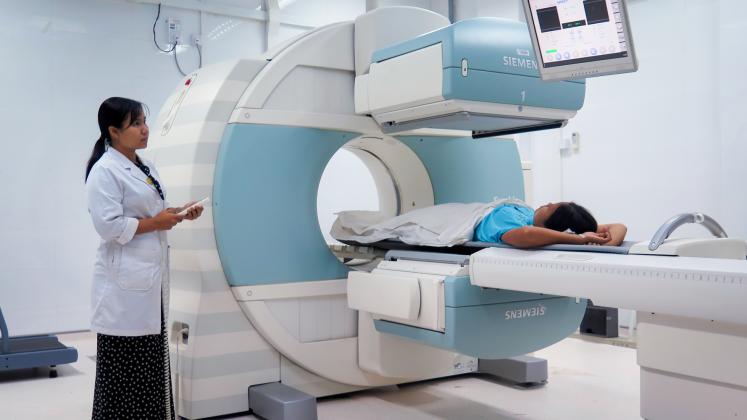According to estimates, there are around 7.6 million people living with HIV in South Africa, the highest number of people in any one country in the world. According to UNAIDS, 4.8 million of these are women 15 and over.
Delphina, (a fictitious name), lives in northern KwaZulu Natal a remote rural area with one of the highest HIV prevalence rates in country. Like many in the region Delphina is living with HIV.
Her husband passed away a few years ago and her only means of survival is the work she does on a local farm. However, she must go every month to the clinic to get her monthly supply of antiretroviral therapy. She has got a fever which she suspects may be tuberculosis but hasn’t been able to get herself tested.
Often when she reaches the clinic, there are long-waiting periods; records can’t be found; and doctor isn’t available. Which means she must make the arduous journey again or decide between staying healthy or feeding her family. Delphina is one of the many stories not just from South Africa but from around the world of the challenges facing people in access to basic health care.
There are many solutions that can solve Delphina’s problems, such as improving human resource management systems and quality of care. Sadly, progress towards achieving this goal has been slow and many gaps remain. While efforts to improve health systems staffing and supply of medicines etc must continue, the emergence of Artificial Intelligence (AI) may provide some new opportunities to improve access to essential health care.
AI can transform health care in several ways, for instance, by improving diagnostics, helping develop new treatments, supporting providers and extending health care beyond the health facility and to more people.
There is increasing evidence that AI based algorithms can assist in analyzing medical images or correlating symptoms and biomarkers from electronic medical records with the characterization and prognosis of the disease. This could be a gamechanger, especially in resource-poor settings where access to specialized care, diagnostics, and recordkeeping is often lacking. COVID-19 showed how technology can and should play an important role in helping stop the spread of the disease, including by disseminating public health messages and increasing access to health care.
There are various points of intersection between AI and health care. AI based models can transform health service management by providing health professionals with real-time medical updates from various sources and revolutionize procurement, supply and management systems preventing stock-outs. Patient data and diagnostics could be another area where AI systems, based on their abilities to assimilate vast data from different sources can provide critical information to providers to improve patient care and diagnostics.
However, technologies, such as AI can also be applied in ways that are detrimental. The associated risks include the potential for AI errors resulting in patient harm and the dissemination of health misinformation. AI could be implemented in ways that erode independent human judgement and control. It could also lead to de-skilling and/or making health professionals redundant and create ambiguities around clinical responsibility, accountability, and liability.
AI could even perpetuate and deepen existing social inequalities in health care due to the non-representative datasets used to formulate algorithms and decision-making models in health care. It could also exacerbate the unequal distribution of access to health care technologies within and between countries of different income levels. Furthermore, there is a danger of viewing AI as a panacea that can solve any problem, when, there are existing solutions to many of the problems we face that do not require AI at all.
Therefore, a fundamental question that arises is how to ensure appropriate use of AI and harness its potential to reach those hardest to reach. A sustainable future requires us to ensure that there is equitable access to AI or AI-enhanced health care for everyone, everywhere.
If AI is ever to fulfil its promise to benefit humanity and society, we must begin by strengthening our public institutions, and ensuring there are effective checks and balances in the AI industry and systems that will emerge. This must include improving transparency and accountability of the parts of the military–corporate industrial complex driving AI and developments, “and the social media companies that are enabling AI-driven, targeted misinformation to undermine our democratic institutions and rights to privacy.”
While all technological developments have the potential to do good, this potential will only be realized if we have a more democratic and equitable social, political and economic order. There is ample evidence that technology is being largely driven and owned by a handful of powerful actors who lack democratic control and accountability. Current laws and regulatory systems to protect privacy and prevent commodification of personal data and ensure fair and equitable access to technology are not adequate. This must change and proper safeguards must be put in place for AI and other technologies to deliver on the promise of better health care for Delphina and millions of others.
Our rights to health and technology are now more interlinked than ever before. George Orwell once said, “Who controls the past controls the future. Who controls the present controls the past.” Without adequate safeguards and protection of human rights in AI and technology, we risk the health and well-being of people today and future generations.
This article was first published by Context. Read the original article on the Context website.
Suggested citation: Tshilidzi Marwala, Rajat Khosla. "AI, Tech and Health: The Time to Safeguard Human Rights Is Now," United Nations University, UNU Centre, UNU-IIGH, 2023-09-19, https://unu.edu/article/ai-tech-and-health-time-safeguard-human-rights-now.



